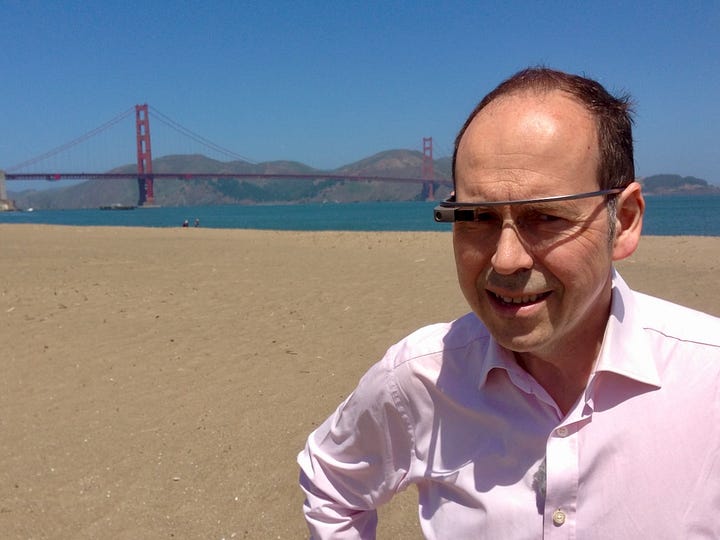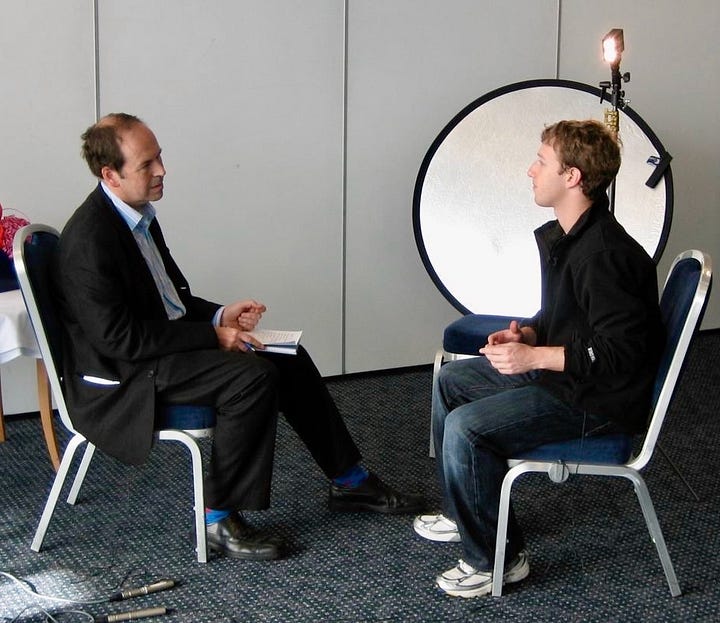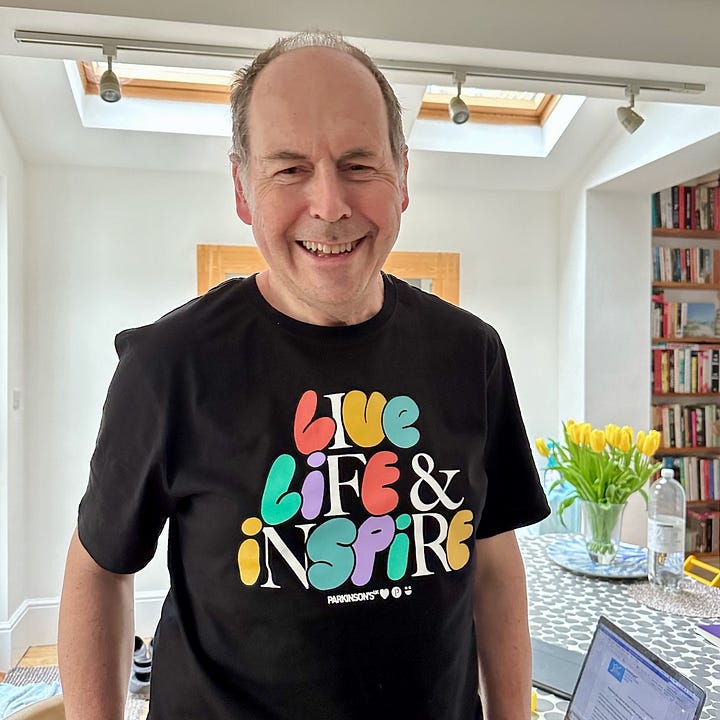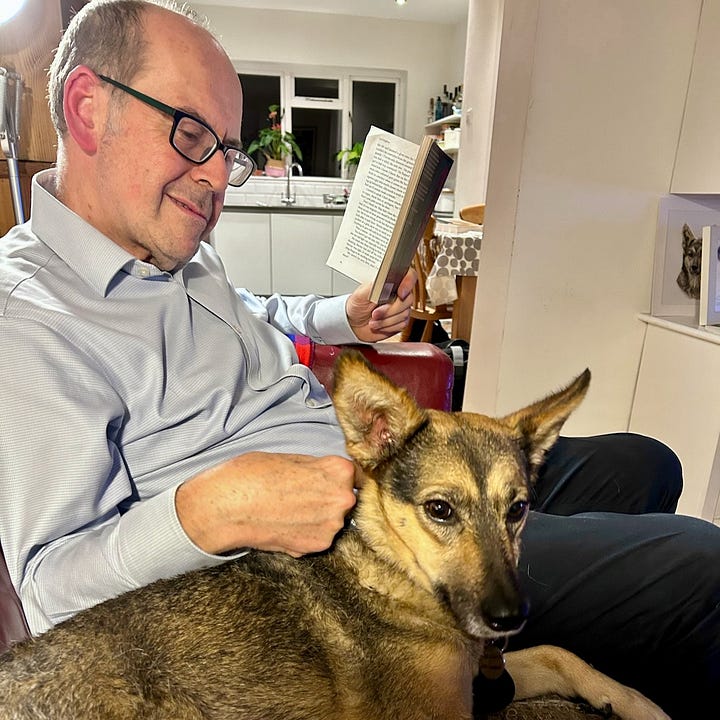And Now for Something...
(almost) Completely Different.
Dear Readers,
If you’ve been with me in these Substacks even a little while, you know my drill: open with something to do with travel, art and/or music, then lean into a reflection about the impact that Parkinson’s Disease is having on my body, mind, and tenancy upon planet Earth.
Today I’m doing something different: I’m devoting this whole episode to an interview. If you don’t have PD, or don’t know someone who does (which applies, unfortunately, to an ever smaller number of people) this may not be your cup of tea; in which case just go back and re-read my lovely post about pumpkins.
But if Parkinson’s does interest you, on any level, I’d like to introduce you to Rory Cellan-Jones.
Sometimes on Substack you come upon a kindred spirit. That is how I felt when I discovered Rory’s Always On Newsletter. Along with this fascinating Substack column about business, tech, and Parkinson’s, Rory is the host of Movers and Shakers, a popular podcast about life with PD (Rory himself was diagnosed in January 2019).
A former BBC correspondent, Rory is based in London. He was with the BBC for forty years, often visiting the San Francisco Bay Area as a tech reporter.
“The BBC is intimately tied up with my family and my history,” Rory tells me during our phone interview. “My mother was a BBC Secretary during the war, and had an affair in the late 1950s with a much younger man in the BBC television drama department. I was the result of that affair, and she brought me up on her own. So the BBC is in my blood.” Rory’s 2023 memoir, Ruskin Park, was recently released in paperback.
As a young man Rory moved around some, living in Paris and West Berlin. He studied languages at Cambridge University, and decided he wanted to get into the BBC. This was in 1981, and Rory was 23. When he failed to get into the BBC training program, he began knocking on doors. At last, the regional BBC newsroom in Leeds gave him a short-term contract.


“Where were you when the Berlin Wall fell?” Covering this story, I knew, was every journalist’s dream.
“I'd come back to London the year before,” he recalls. “But I was a very junior reporter, and however much I protested that I spoke German and had lived in West Berlin, they were never going to send me.“
The BBC put him to use as a business reporter, which led naturally into tech. “I was bewitched by technology, and found those stories far more interesting than the run-of-the-mill business stories I was doing.”
In 2007, the BBC officially made Rory their Technology Correspondent. “My first assignment was to go to CES in Vegas with a big BBC television team. I said to them, ‘This is great, but we need to take a day out to go to MacWorld in San Francisco.’ And that was my first big story. That was the launch of the iPhone.”


Rory’s diagnosis came in 2019, the year before the pandemic. “My first symptom had been the previous summer. My wife and I were on holiday in Italy, and I kept dragging my right foot. My wife kept saying, ‘Pick your feet up!’ At about the same time I was on TV, talking about broadband access while holding a cable in my right hand. A viewer wrote in to the BBC, noticing I had a tremor. So I wasn’t surprised by the diagnosis.”
But Rory had another pressing concern. In late 2004 he had been diagnosed with a malignant melanoma behind his left eye. “Eye cancer, basically, which was very frightening. Parkinson’s was not as immediately scary, by comparison, as that cancer diagnosis. And I’m still under observation for that, 20 years later.”
Rory kept relatively quiet about his PD, until a colleague noticed his hand shaking during a BBC shoot. “My producer, who knew me quite well, said ‘have you ever thought of going public about your Parkinson's? It's really obvious on the TV.’”
Rory — by then a longtime tech nerd — had quite a large following on Twitter. “So I knocked out a tweet saying, ‘some people have noticed my hand shaking. I've been diagnosed recently with Parkinson’s. I'm getting good treatment, onwards and upwards.’ It had an absolutely huge effect; the explosion of goodwill was extremely heartening. So I did a couple of things about it on the BBC website. But my Substack didn't start until 2021 — after I’d left the BBC.”
Rory’s Substack focuses on health and technology. “But every now and then I write something completely off topic — even about my Romanian dog Sophie, who's become an Internet sensation.”
“Can you talk about how your relationship with PD manifested, and say a bit about your progression?”
“I was in depression for the first year, and I didn't really talk about it to anybody. But you know, depression itself is a symptom. Funny enough, I came out of it when we went into lockdown; I had to work out how we could put a weekly radio program together from my loft and my producer's kitchen. That was very purposeful, and I was quite stimulated by that. But physically, it didn't seem too bad.
“So for the first two or three years I thought, secretly, I don't know what all the fuss is about. This doesn't seem that bad. But then I did a couple of TV pieces about Parkinson's, and they filmed me walking. When I saw the pieces, I thought, ‘Jesus, who is that old, shambling wreck?’ I didn't know I walked like that. That was a bit sobering.
“And then a year ago, something really bad happened. I had a fall, a really bad fall.” Rory was going to babysit for his two grandchildren. When he got off the train it started raining. He began to run, and tripped over a branch on the sidewalk. “I ended up losing a tooth and, much worse, fracturing my elbow. I had a terrible week before they finally operated on me, and that really took me down a level. If you think of it as that game ‘Snakes and Ladders’ [‘Chutes and Ladders’ in the U.S.], I took a snake.”
“How do you keep your symptoms under control?”
“All I'd say is, I take my pills on time. I do walk our dog, although that’s very stop/start. And I do Pilates once a week. I'm not as good as I should be — but I do try to keep reasonably active.”
“We’ve just begun the new year,” I note. “Are there any encouraging developments in treatment?”
“Let's be frank.” Rory sighs audibly. “It’s been a pretty depressing time. Do you know about Exenatide? What happened is quite extraordinary.”
Current treatments for PD so far, Rory explains, only mask the symptoms. But there is nothing to slow down, halt or reverse the disease — which is the definition of a cure. Exenatide was set to be the first of these disease-modifying drugs. There was huge hope for it and confidence in it. But to everyone’s shock — after decades in development — it was a complete failure in the Phase 3 clinical trial. “It was shocking,” says Rory. “A real body blow.”
“So the current outlook on disease-modifying drugs is pretty cloudy. The next one that's coming along is Ambroxil. It’ll be at least three years before we know the result of that Phase 3 trial. There is some very exciting stuff going on with gene therapy — effectively growing dopamine, and putting it back in your brain. Which is pretty exciting but again, really, really difficult, and it always takes longer than you'd imagine. So we've got this crazy situation where AI is supposedly taking off and changing our world in just a few months. Meanwhile, a drug like Exenatide has its first trials in 2008, and it takes 16 fucking years to fail!”
“Is there anything at all to watch for in 2025?”
“There are various devices and gadgets, which I've been enthusiastic about to some extent, but... Let me try to be cheerful. There's a thing by a British guy named Carl Beech, called the ‘Beech Band.’ Carl has early onset— his speech is quite badly affected— and has discovered that if he taps his chest at a certain rate while he's speaking, he speaks far more clearly and coherently. And he's turned this into a gadget, like a wristwatch, which produces this rhythm. He demonstrated it for me in a video. Of course it could be a placebo effect, but it was pretty impressive. And unlike many of these things, his device is not very expensive. So I'm interested in seeing how that goes in 2025.”
I remark that the invention is similar to the vibrating glove being developed at Stanford, and the vibrating shoe that Rory described in a recent Substack.
“Yeah. there's this whole area called ‘cueing.’ The theory is that if you set up some kind of signal—either a sound signal or a vibration at a certain rate—it can help PD people move more freely, not freeze, and so on. And that's what the vibrating shoes do. I've got my own trainers plugged in.” He laughs. “They're recharging. Who has to plug in their trainers!?”


“So these are all interesting ideas,” Rory says. “But what we have to face up to is that the big advance in Parkinson's treatment came 60 years ago, with Levodopa. In terms of drugs, nothing dramatic has happened since. There is of course DBS (deep brain stimulation), which is invasive [it involves putting two wires in the brain and implanting a controller near the collarbone] but steadily improving.”
I end our chat with a personal question. “I never know what to say to people who tell me they've just been diagnosed. What advice do you give? How do you keep them from going into a downward spiral?”
“I tell them that one of the most important things is seizing the day and having a positive outlook. I mean, I've had some of my most productive years since my diagnosis. I've written two books; I’ve been involved with starting an award-winning podcast. In some ways, Parkinson's has been great for me. I don't quite say that... but it is certainly one of those areas where, you know, attitude is important.”
I couldn’t have said it better myself.
Thank you, Rory. And thanks to all of you who read this far! Enjoy the remainder of January, subscribe (if you haven’t already), and I’ll see you with another one of my more traditional posts on Groundhog Day.



When i was diagnosed i was relieved because it meant i didn't have leukaemia or prostate cancer which had escaped my prostate before I had it out, or some other nasty thing like MND. At last I knew why I was/am knackered all the time.
Great article!